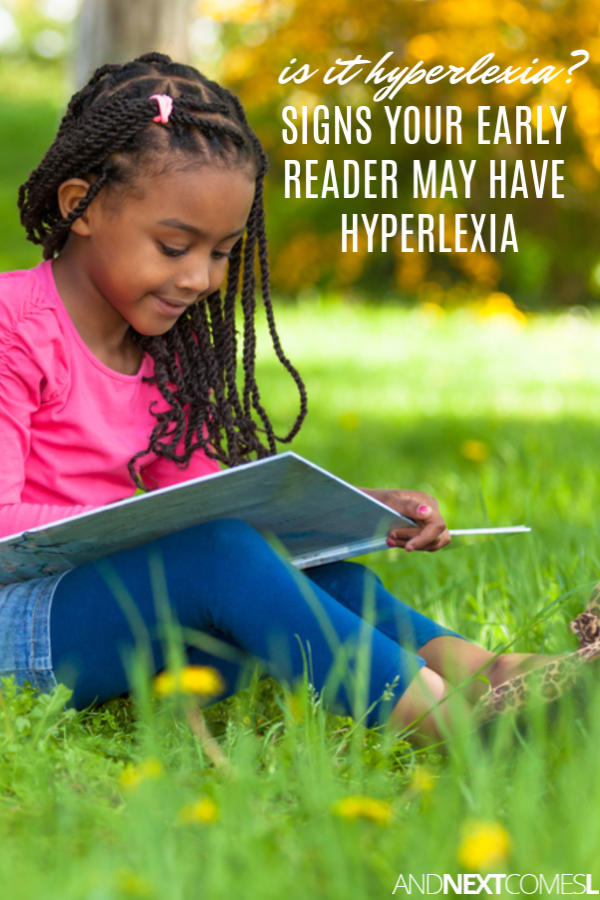How to know if your early reader is hyperlexic, including a definition for what hyperlexia is and what the signs of hyperlexia are.
When J first started reading just before he turned two, I was shocked. He couldn't honestly be reading, could he?
So I started spelling random words before him and he would read them back to me time and time again.
I remember thinking, wow, this kid is really something special.
And he is, but as he grew older and other issues started appearing, I started seeing a gap between his amazing ability to read and his speech.
I searched and searched, to no avail. I simply could not figure out what was going on.
Did he have sensory processing disorder?
Did he have autism?
Was he just gifted and really sensitive?
Years later I would learn that J has hyperlexia and it was exactly what I was looking for in my original searches.
So what is hyperlexia and its signs? And how is it different from early reading?
Hyperlexia or Early Reader?
Hyperlexia is a precocious self-taught ability to read at an early age, usually before the age of five, accompanied by intense fascinations with letters and numbers, as well as significant difficulties in oral language. So a child with hyperlexia usually has speech problems and difficulties with comprehension.
In contrast, an early reader develops normally and are considered neurotypical with no issues with speech and/or comprehension. These kids can be classified as hyperlexia type I, as proposed by Dr. Treffert. Although not everyone agrees on this classification system.
Signs of Hyperlexia
Here are some of the signs of hyperlexia, above and beyond the self-taught ability to read at an early age:
1. Intense fascinations with letters, numbers, maps, and logos
These fascinations can almost be OCD-like in nature. Often these kids don't want to play with anything other than whatever they are fascinated with. You can read more about these intense fascinations here.
For instance, Kara shared in our hyperlexia support group that her son "began carrying a letter W magnet around with him everywhere around 18 months. It was his security item!" We had similar experiences as J would play and carry around letters everywhere he went. His security item was an English/Spanish ABC flashcards book that he carried everywhere (until it was beyond recognizable)!
2. Significant difficulties with verbal language
Kids with hyperlexia struggle with verbal language, both understanding it and speaking it themselves. Hyperlexic children struggle understanding "WH" questions and often appear to be selective listeners. They rarely initiate conversations, which was a huge telltale sign for us, and their speech is often echolalic in nature. They also struggle understanding abstract language and are literal thinkers. You can read more about the conversation skills of kids with hyperlexia here.
3. Develop normally, but regress around 18-24 months
Unfortunately for me, my memory is fuzzy around this time period because I was so pregnant with K at the time, but I do know that J's fascination with letters became evident around 19 months. I don't recall him really regressing, but after speaking with other families, they did notice a period of regression with their children during this time. For instance, Chelsey shared in our hyperlexia support group that her son "regressed at 18 months and lost all of his words, except for numbers, by 2 years of age."
4. Awkward social skills
Hyperlexic kids are awkward socially, which isn't surprising since most of these kids also receive an autism diagnosis alongside the hyperlexia label. J has always bonded better with adults instead of other kids and after discussions with other families, they have noticed a similar pattern with their kids. Their difficulties with verbal language likely contributes to the social skills difficulties, which I have definitely noticed with my son when he interacts with his classmates.
What to Do if You Suspect Your Child May Have Hyperlexia
If you think your child may have hyperlexia, then start by reading everything you can about hyperlexia and ask for a referral to a speech pathologist and/or psychologist. Here are some other helpful resources that you may be interested in:
- Free Hyperlexia Handbook
- Diagnosing Hyperlexia
- Books About Hyperlexia
- Hyperlexia Resources for Parents
This post is part of a monthly series called Parenting Children with Special Needs. This month's topic is recognizing signs and you can find the other posts regarding this topic below.
Autism What to Know and Signs to Watch For | Natural Beach Living
How to Recognize Signs of a Mood Disorder in Young Children | Every Star is Different
Seeing the Signs of Childhood Trauma | STEAM Powered Family
Recognising signs as a first time special needs parent | My Home Truths
Hemophilia, Juvenile Arthritis, and Allergies… Oh my | Grace and Green Pastures
Myths About Recognizing Developmental Delays | Life Over C’s
Recognizing the Signs of Reactive Attachment Disorder | The Chaos and The Clutter
7 Sanity-Saving Tips if You Think Your Child has Special Needs | B-Inspired Mama
When They Say It’s Just Your Parenting | This Outnumbered Mama
How to Deal with the Unexpected Learning Disability | Kori at Home
Forgiving Myself for Denying the Signs of Autism in My Daughter | Parenting Chaos
Ripples on a Pond: Warning Signs of Early Childhood Development Problems | 3 Dinosaurs
When to Know Your Child Needs Help | Carrots Are Orange
When to Know Your Child Needs Help | Carrots Are Orange



